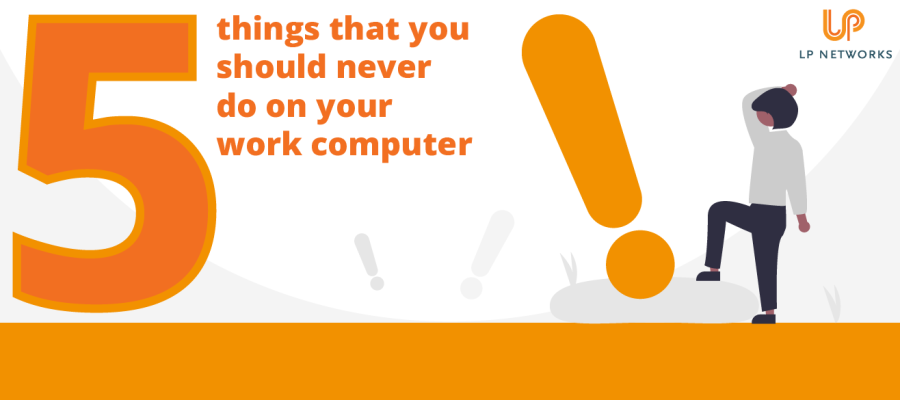- Solutions For
Specialist IT Support Services for:
- Popular Services
- Security
Security
- Our Expertise
Our Full Range of IT Services
- Learn
- About Us
- Contact
Posted 28th July 2022


LP Lowdown, is LP Network's regular free newsletter designed to keep you up to date with all the latest IT news, security updates, and available products. Learn more.
When you’re working in front of a screen all day it’s very easy for the line between personal and work use to become blurred. However, it doesn’t matter whether you are working in an office environment or remotely from home, there are several activities that are a total no go when you’re using a work computer.
Aside from potentially getting reprimanded for using your work device for personal use, there are also potential security issues as well. While it might seem harmless to do a bit of online shopping, check your social media, or send personal emails, these activities could potentially lead to you losing your job.
Here are five things you should never do on your work device.
We know it’s so much easier to manage passwords by saving them in a browser, but what happens if you lose access to the computer? If your computer is provided by your workplace, it can be removed for upgrades, repairs, or if it's broken.
If you didn’t sign out of your browser, it means that anyone who accesses the device will have access to your passwords and your Cloud accounts. Additionally, if your company donates its old computers to worthy causes, your passwords could end up in the hands of a stranger if the device hasn’t been properly wiped.
Storing personal data on your work computer is also a "no-no". Firstly, if you lose access to the device, you’ll lose any personal files that you have stored. Secondly, if the company you work for performs regular backups to prevent data loss, those pictures of that Friday evening when you had one too many cocktails could become accessible to the rest of the company because they were caught in the backup process – also bringing the complexities of GDPR and personal data on business networks into play.
If you’re using a work device, you need to be prepared that your activities will be monitored and visible to your boss. Many companies also have DNS filtering in place to protect them from phishing websites, so if you try to visit somewhere a little shady, your employers may receive an alert.
As a general rule of thumb, don’t use your work computer to visit any websites that you wouldn’t be happy for your boss or other employees to see.
You’re working from home, your work laptop is permanently sitting on the kitchen table, it’s going to be tempting to let a friend or family member quickly use it. However, because of the sensitive nature of the information potentially saved on the device, you could find yourself in breach of GDPR.
Additionally, the computer is your responsibility and is loaned to you to do your job. You have, hopefully, been trained to recognise phishing sites. A friend or family member may not be as observant and could potentially infect your computer, which could in turn infect your company’s Cloud. And you would be held responsible for that happening.
However tempting it may be to turn off backups to improve performance, there’s nothing worse than an alert telling you your computer needs to restart when you’re up against a deadline, don’t do it. Turning off backups can leave your computer unprotected and can create a gap in your company’s cybersecurity protection. You should only ever turn off backups and updates if you have permission from your IT team.
Have you signed up to receive our monthly IT newsletter? The LP Lowdown helps you stay up to date with with advice and information on IT and Cyber Security. Sign up here

Complete this quick form and LP Lowdown will arrive to your inbox in minutes.

